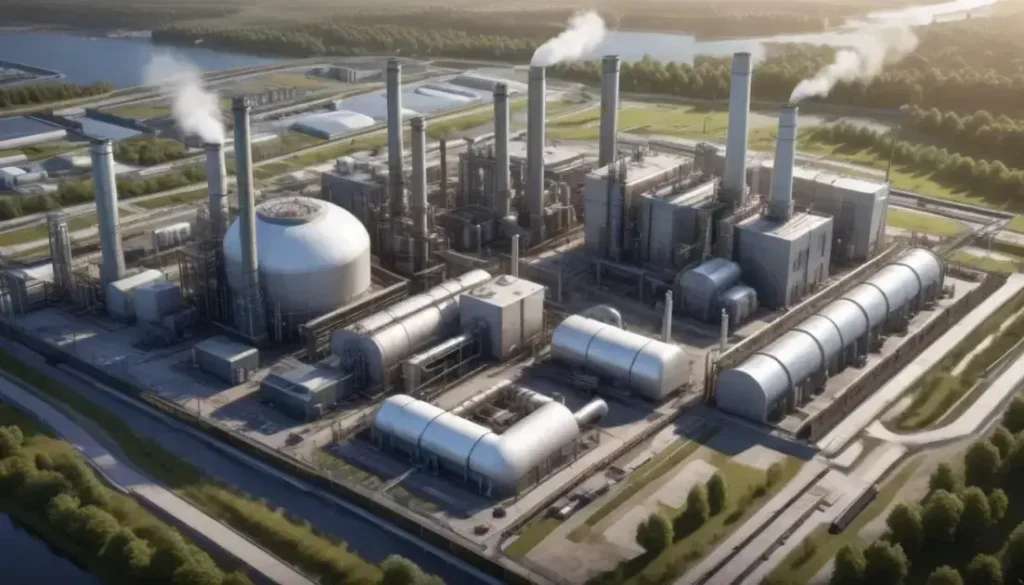Sustainability presents numerous opportunities for American businesses, including the development of green technologies, participation in carbon credit markets, and improved operational efficiencies that enhance brand reputation and drive growth.
In a groundbreaking move, the partnership between SAP and Climeworks aims to redefine carbon management in the enterprise sector. This innovative collaboration promises to bring significant advancements to corporate sustainability efforts, paving the way for a greener future.
Overview of the SAP and Climeworks Partnership
The SAP and Climeworks partnership is designed to revolutionize the way businesses approach carbon removal and sustainability. By leveraging Climeworks’ innovative direct air capture technology, SAP aims to provide its clients with effective solutions for carbon management.
This partnership facilitates the creation of robust carbon credit systems, allowing companies to secure verified carbon removal credits efficiently. Such capabilities are essential for businesses committed to achieving their carbon neutrality goals.
Furthermore, SAP’s extensive cloud infrastructure supports the integration of Climeworks’ solutions directly into enterprise resource planning (ERP) systems. This seamless integration enhances operational efficiency and data transparency, ensuring businesses can track their carbon emissions in real time.
As sustainability becomes a priority for enterprises, the collaboration between SAP and Climeworks illustrates the potential for technology to drive significant impacts in environmental responsibility. Companies leveraging these innovations can demonstrate their dedication to environmental stewardship in a competitive business landscape.
Goals of the Partnership for Decarbonisation
The goals of the SAP and Climeworks partnership focus on advancing decarbonization efforts across industries. By harnessing cutting-edge technology, the collaboration aims to facilitate the removal of carbon dioxide from the atmosphere effectively.
One of the primary objectives is to create scalable solutions that businesses can implement to meet their sustainability targets. This includes integrating carbon removal processes into existing operational frameworks to enhance efficiency and track progress.
Another key goal is to provide companies with access to verified carbon credits. This empowers businesses to offset their emissions, making a substantial contribution to their overall carbon footprint reduction.
Further, the partnership emphasizes educating organizations about the importance of decarbonization. By raising awareness and providing resources, SAP and Climeworks aim to promote proactive engagement in climate action among enterprises.
In summary, the partnership’s goals are not just about technological advancement; they also focus on fostering a culture of sustainability within the corporate sector, enabling businesses to thrive while actively combating climate change.
Carbon Removal Credits Secured by SAP
SAP’s initiative to secure carbon removal credits forms a cornerstone of its sustainability strategy. By collaborating with Climeworks, SAP aims to help businesses purchase verified credits that represent actual carbon dioxide removed from the atmosphere. This is critical for companies aiming to meet their climate goals.
The process of acquiring these credits involves a rigorous validation system, ensuring that all carbon removal actions are genuine and measurable. Companies can then confidently report their progress toward carbon neutrality, bolstering their credibility in the market.
These credits not only serve as an offset for emissions but also encourage investment in innovative carbon capture technologies. As businesses become more aware of their environmental impact, the demand for these credits is expected to rise, creating a marketplace where sustainability and profitability align.
Moreover, SAP’s facilitation of carbon credits encourages organizations to take proactive measures in their sustainability journeys. By making carbon removal accessible, SAP empowers companies to contribute positively toward combating climate change while enhancing their corporate responsibility.
Diverse Carbon Management Techniques
Implementing diverse carbon management techniques is crucial for businesses aiming to enhance their sustainability practices. These techniques encompass a range of methods designed to effectively reduce carbon emissions and capture greenhouse gases.
One approach involves the use of direct air capture (DAC) technology, which extracts carbon dioxide directly from the atmosphere. This method has gained traction due to its ability to offset emissions at scale. Coupled with advances in renewable energy sources, DAC can significantly contribute to achieving net-zero targets.
Another technique is carbon sequestration, where carbon is stored underground in geological formations. This process prevents CO2 from re-entering the atmosphere, playing a vital role in long-term climate strategies. Understanding the geophysical properties of potential storage sites is essential for ensuring safety and effectiveness.
Many companies are also exploring natural carbon management options, such as reforestation and soil management. These methods enhance natural carbon sinks and contribute to biodiversity conservation, creating a holistic approach to carbon management.
Finally, integrating carbon management into business strategies allows for real-time tracking of emissions and the establishment of actionable goals. This proactive stance positions companies as leaders in the transition to a sustainable future, making them more competitive in a rapidly evolving market.
Utilization of SAP’s Cloud Solutions by Climeworks
Climeworks, a leader in carbon dioxide removal technology, leverages SAP’s cloud solutions to enhance its operations and sustainability efforts. By integrating these advanced cloud technologies, Climeworks can effectively monitor and manage its carbon capture processes.
Using SAP’s cloud platform allows Climeworks to collect and analyze data in real-time. This capability is essential for optimizing their direct air capture systems, as it enables quick adjustments based on performance metrics. The cloud solutions also facilitate the scalability of their operations, allowing them to respond swiftly to increasing demand for carbon credits.
Additionally, SAP’s cloud infrastructure enhances collaboration across teams and partners. By centralizing data on a cloud platform, Climeworks can streamline communication and ensure that all stakeholders are informed and engaged in the sustainability mission. This connectivity supports the implementation of innovative strategies tailored to meet evolving market needs.
The integration of SAP’s cloud solutions ultimately empowers Climeworks to uphold **transparency and accountability** in its carbon management practices. This not only strengthens their position in the market but also aligns with global efforts to mitigate climate change. As more companies seek sustainable solutions, Climeworks’ utilization of cloud technology stands as a model for the industry.
Impact on Business Operations and Compliance
The impact of carbon management initiatives on business operations and compliance is profound. Companies like SAP and Climeworks are leading the way in integrating sustainability practices into their core operations. This shift not only enhances their green credentials but also influences their overall business strategy.
First, adopting sustainable practices helps businesses streamline operations. By optimizing processes to reduce emissions, organizations often find efficiencies that lower costs. Such improvements align directly with their compliance objectives, ensuring that they meet regulatory requirements while enhancing profitability.
Moreover, transparency in carbon management leads to better reporting. Businesses are increasingly required to disclose their carbon footprints. Implementing effective carbon management systems enables organizations to present accurate and reliable data to stakeholders, thereby maintaining trust and compliance with environmental regulations.
Additionally, organizations that prioritize carbon neutrality can gain a competitive edge. As consumers and partners become more environmentally conscious, demonstrating commitment to sustainability can be a major differentiator in the marketplace. This commitment not only attracts customers but also fosters loyalty among stakeholders who value corporate responsibility.
Ultimately, the integration of carbon management strategies supports businesses in not only achieving compliance but also positioning themselves as leaders in their industries.
Next-Generation Sustainability Solutions
Next-generation sustainability solutions are pivotal to addressing the urgent climate challenges of our time. These solutions encompass innovative technologies and practices that drive significant reductions in carbon footprints while promoting environmental stewardship.
One notable example is the implementation of artificial intelligence in managing energy consumption. AI systems can analyze data in real-time, optimizing energy use across facilities and identifying inefficiencies. This not only reduces costs but also minimizes waste, supporting a more sustainable operational framework.
Additionally, advances in renewable energy technologies enhance sustainability efforts. Businesses are increasingly adopting solar panels, wind turbines, and energy storage systems, which provide clean energy alternatives. By transitioning to renewables, companies can decrease their reliance on fossil fuels, making substantial strides toward achieving net-zero emissions.
Moreover, engaging in circular economy practices is becoming essential. This approach focuses on reusing materials and resources to create a closed-loop system, minimizing waste and promoting sustainability within supply chains. Transitioning to circular practices ensures that businesses can thrive economically while supporting environmental goals.
Ultimately, next-generation sustainability solutions not only fulfill corporate social responsibilities but also provide a competitive advantage. As consumers increasingly favor environmentally conscious brands, businesses adopting these solutions are likely to see enhanced market positioning and customer loyalty.
Integration of Carbon Management into ERP Systems
The integration of carbon management into enterprise resource planning (ERP) systems is becoming a vital component for businesses aiming for sustainability. By embedding carbon management into existing ERP frameworks, organizations achieve seamless tracking of emissions and resource usage across all departments.
One of the primary benefits of this integration is real-time data analysis. Businesses can monitor their carbon footprints as they monitor other key performance indicators. This visibility allows for immediate adjustments in operations to reduce emissions and improve efficiency.
Additionally, integrating carbon management helps ensure compliance with evolving environmental regulations. Companies can generate necessary reports and documentation directly from their ERP systems, simplifying the auditing process while maintaining transparency. This proactive approach not only mitigates risks but also enhances corporate reputation.
Moreover, integrating these systems fosters collaboration across teams. Departments such as finance, operations, and supply chain can work together towards achieving common sustainability goals. By aligning their strategies, companies can ensure that carbon reduction efforts are consistent and coordinated.
Finally, this integration can lead to substantial cost savings. By identifying inefficiencies and waste in real time, organizations can optimize their resource utilization, leading to reduced operational costs while contributing to their overall sustainability objectives.
Opportunities for American Businesses
The focus on sustainability is opening up numerous opportunities for American businesses across various sectors. As global awareness of climate change intensifies, companies that adopt sustainable practices can gain a competitive edge in the marketplace.
One significant opportunity lies in the growing demand for green technologies. American firms that innovate and produce environmentally friendly products, such as renewable energy solutions and energy-efficient appliances, are likely to capture the attention of eco-conscious consumers and investors alike.
Moreover, businesses can explore the potential of carbon credit markets. By investing in carbon offset projects or implementing robust carbon management systems, companies can earn revenue while contributing to environmental goals. This dual benefit enhances both corporate responsibility and profitability.
Additionally, sustainability initiatives can improve operational efficiencies, leading to cost savings. By optimizing resource use and minimizing waste, firms not only contribute positively to the environment but also experience lower operating costs.
Finally, as regulations surrounding environmental impact become more stringent, businesses that proactively embrace sustainability will likely face fewer compliance challenges. This readiness can further solidify their market position and enhance their reputation among customers and partners.
In Conclusion: Embracing Sustainability is Key
American businesses are at a pivotal moment where embracing sustainability can lead to significant advantages. By integrating sustainable practices, companies can not only reduce their environmental impact but also open up new avenues for growth.
The opportunities to innovate through green technologies, engage in carbon credit markets, and improve operational efficiencies are immense. As more consumers seek eco-friendly options, businesses that prioritize sustainability will thrive.
Ultimately, taking proactive steps toward sustainability is not just good for the planet; it also makes good business sense. Companies that invest in sustainable practices will be better prepared to face future challenges and maintain a competitive edge in an ever-evolving market.
Frequently Asked Questions
What are the benefits of integrating sustainability into my business?
Integrating sustainability can enhance your brand image, attract eco-conscious customers, and lead to cost savings through improved efficiency.
How can my business take advantage of carbon credit markets?
Your business can invest in projects that reduce emissions and earn carbon credits, which can be sold or used to offset your own emissions.
What types of green technologies should I consider?
Consider renewable energy sources, energy-efficient appliances, and technologies that optimize resource use to lower your environmental impact.
How can embracing sustainability improve my company’s reputation?
By showcasing your commitment to sustainability, you can build trust with consumers and partners who value environmental responsibility.
What are operational efficiencies, and how do they relate to sustainability?
Operational efficiencies refer to streamlining processes to reduce waste and cost, which directly supports sustainability by minimizing resource usage.
Is sustainability good for business growth?
Yes, adopting sustainable practices can lead to new market opportunities, cost savings, and enhanced customer loyalty, all contributing to business growth.


